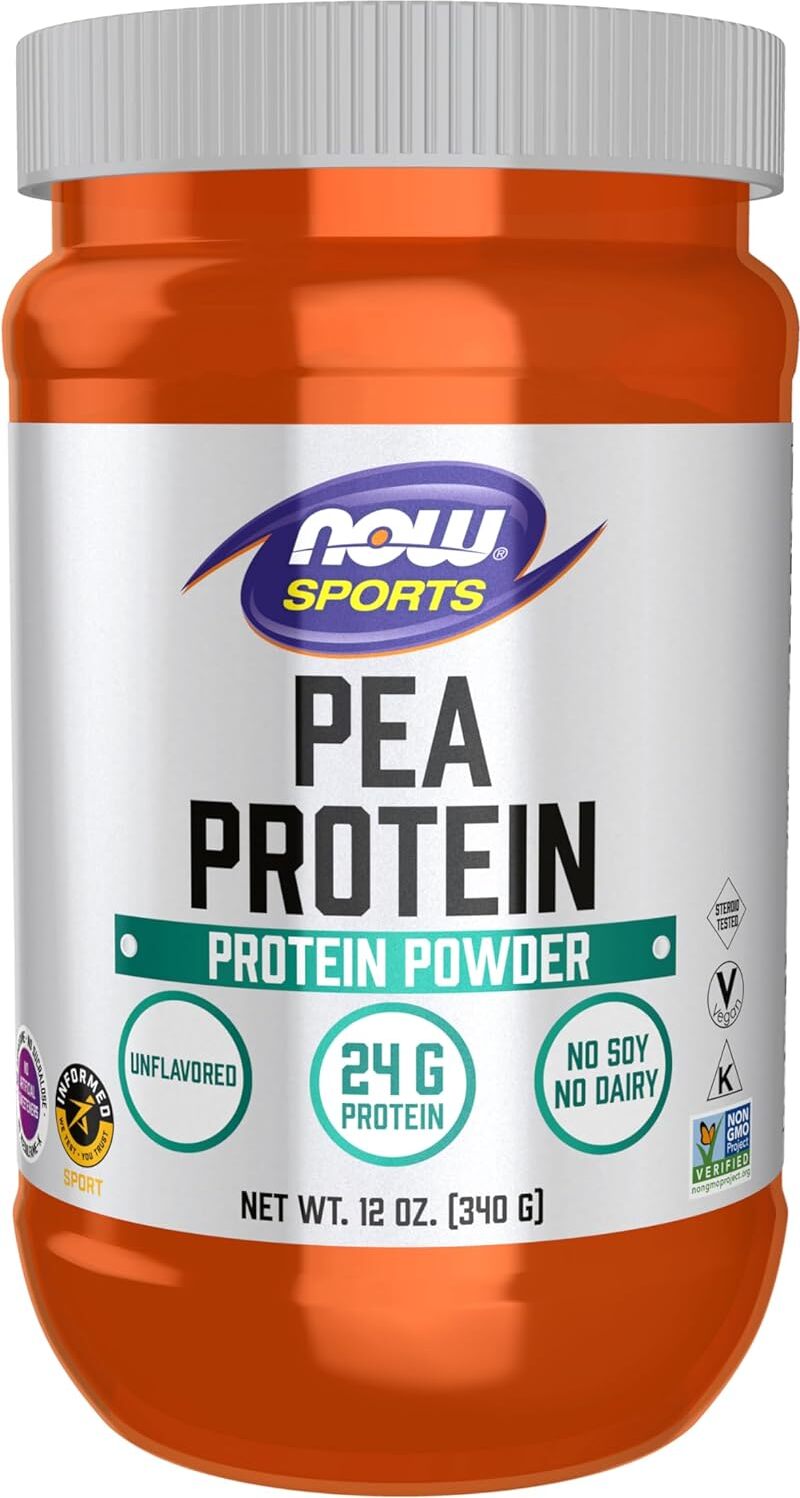
Time to consider pea protein? The results look great... but keep reading to see why we're not yet ready to make the jump.
If you’re supplement-savvy (and who out there reading this blog isn’t?), then you may have heard through the grapevine that Pea Protein is on the rise!
And a new study is giving it even more fuel for its recent surge of sales:
According to a new study published in the Journal of the International Society of Sports Nutrition, pea protein provided the same improvements in muscle thickness as compared to a test group that supplemented with whey protein.[1]
This is great news for vegans, vegetarians, environmentally-conscious fitness buffs, and lactose intolerant individuals -- there's just one major issue with pea protein, though. But let's start with the new research first:
The Study
Researchers recruited 161 men to partake in a randomized, double-blind, placebo-controlled clinical trial.The men were divided into 1 of 3 groups:
- Pea protein
- Whey protein, or
- The placebo group
...and all of them engaged in resistance training (i.e. weight lifting) for 12 weeks.
Over the course of the 12 weeks, the groups were administered 25g of protein (or placebo) twice a day, everyday. At the end of the study, all men appeared to benefit from the resistance training with little difference between any of the groups.
However, researchers zeroed in on the weakest of the individuals in the trial and noticed a significant difference between the group that was given the pea protein supplement and those that received the placebo.
Pea Protein yielded significant gains over placebo
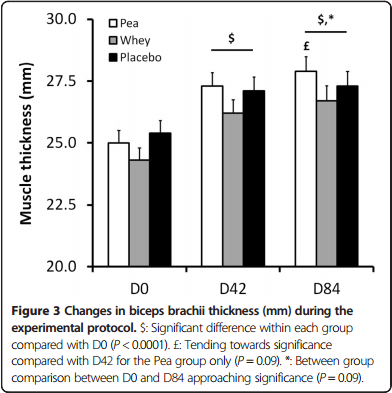
Pea Protein and Whey Protein were both significantly better than placebo (not surprising), but not significantly different from each other.[2]
The men in the pea protein group experienced a 20.2% increase in biceps brachii thickness compared to only an 8.6% increase for the placebo group (those must be the guys doing curls in the squat rack).[2]
...and pea protein worked just as well as whey protein!
What’s more is that when looking at the increases experienced by the whey protein group, the differences were so miniscule that there was no significant statistical difference.
Why Should You Care?
Since no statistical difference was found between the whey and pea protein groups, quality vegetable proteins can be used as an alternative source of protein to fuel all of your anabolic desires! Gone are the days of having to choke down dry chicken breast, cans of tuna, or endless whey shakes to fuel your GAINZ without adding too much fat.
This is especially good news for the lactose intolerant lifters who now have another supplemental option for their protein shake instead of having to pay for expensive pure whey isolates.
Easy on the wallet
Unlike the isolates, it's relatively cheap. Right now as we publish this, there are products out there that yield over 50g protein per dollar - which is worthy of our hot supplement deals page for whey protein!
Check out the pricing on pea protein down below for more info:
Pea Protein – Deals and Price Drop Alerts
Get Price Alerts
No spam, no scams.
Disclosure: PricePlow relies on pricing from stores with which we have a business relationship. We work hard to keep pricing current, but you may find a better offer.
Posts are sponsored in part by the retailers and/or brands listed on this page.
Extra Perks: The Pea Protein Benefits
But what if you’re not vegan, vegetarian, lactose-intolerant, environmentally conscious, GMO phobic, etc. Is there anything else good about pea protein?
The answer is yes -- pea protein has numerous benefits, among those:
- Helps with satiety[3]
- Cholesterol free
- Combats high blood pressure[4]
- Lowers triglyceride and cholesterol[5]
This is not uncommon from other vegetable sources of protein.
Plus, it boasts a complete amino acid profile, so there is no need to worry about “food combining” to make sure you ingest all of the necessary amino acids to form a complete protein.
Market Implications
We expect a LOT more pea proteins to start showing up on the market. A few are already out there and you can see more on those on our pea protein page.
Looking at market trends, you can see there has been a BIG trend UPWARD (check out the graph below) with MarketWatch predicting the pea protein market to be worth an estimated $32 million by 2019.[6]
But the fact remains, it’s still small peas compared to whey as you can here:
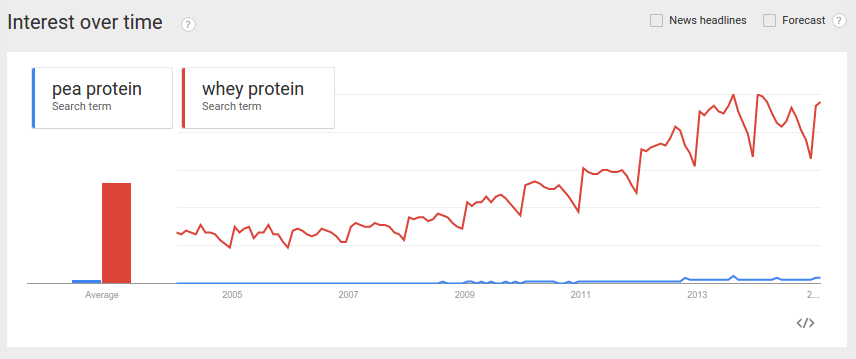
Pea Protein's blue line doesn't look so impressive anymore. Compared to whey protein in red, it still has a long way to go. We discuss what's holding it back below.
Final Thoughts
This study shows great promise for the future of not only pea proteins but other vegetarian sources of protein as well, especially in regards to sports nutrition. So you can rest assured that more and more companies will start coming out with their own line of pea protein.
Where everything falls apart...
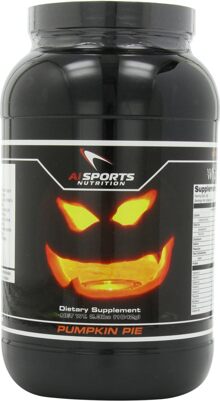
NO WHEY by AI Sports Nutrition adds rice protein to make it taste better, but it's still nowhere near a decent whey protein powder
There’s one caveat that needs to be addressed by all manufacturers... it tastes like peas!!!!
If you haven't tried a pea protein powder yet, it literally does taste and smell like peas. And worse yet, if you have the terrible misfortune to burp sometime after drinking a shake, you will burp peas. Not a glowing experience.
Rice Protein to the Rescue? A bit, but not really...
To balance out the awful taste while remaining vegetarian-safe, supplement companies have been adding rice protein (or brown rice protein), which has a slightly inferior amino acid profile, but tastes far better.
A popular product is AI Sports Nutrition's NO WHEY. And while it's "good", it's still not "good enough" for mass public consumption. Die-hard vegetarians who are finally realizing that they need higher protein intakes in order to look more attractive will happily drink it. But as of early 2015, pea protein and pea / rice protein mixes (which can be found on our main vegetable protein page) are still just not yet there for the masses.
The first company to figure out how to FULLY dominate the pea protein flavor is going to make huge money. Until then...vegetarians will just have to deal with what’s currently available.
Pea Protein – Deals and Price Drop Alerts
Get Price Alerts
No spam, no scams.
Disclosure: PricePlow relies on pricing from stores with which we have a business relationship. We work hard to keep pricing current, but you may find a better offer.
Posts are sponsored in part by the retailers and/or brands listed on this page.
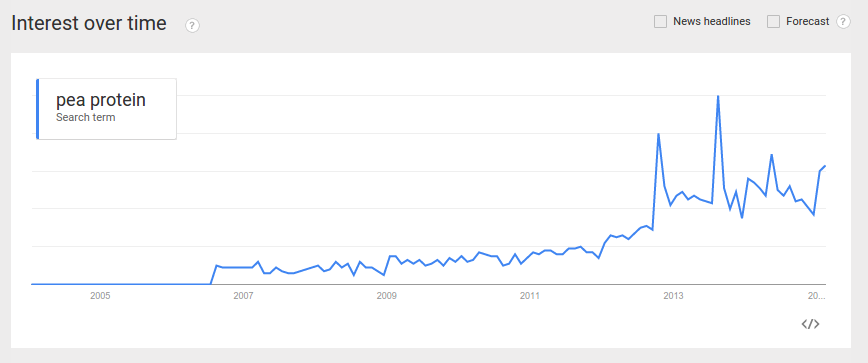


Comments and Discussion (Powered by the PricePlow Forum)